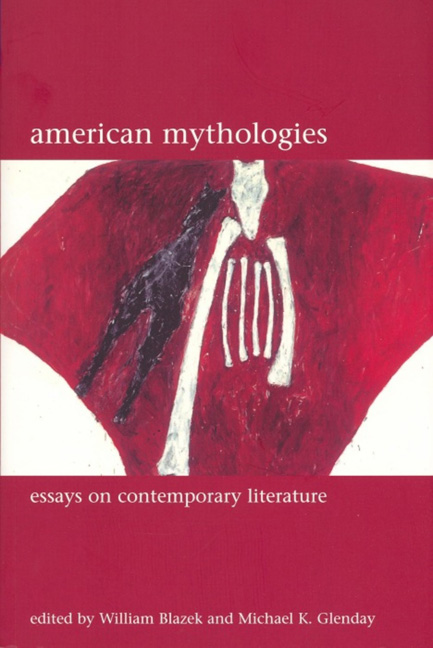Book contents
- Frontmatter
- Dedication
- Contents
- Acknowledgements
- Introduction
- 1 Indians with Voices: Revisiting Savagism and Civilization
- 2 Wild Hope: Love, Money and Mythic Identity in the Novels of Louise Erdrich
- 3 Float Like a Butterfly, Sting Like a Bee: Mythologies of Representation in Selected Writings on Boxing by Norman Mailer
- 4 The Secret Sharing: Myth and Memory in the Writing of Jayne Anne Phillips
- 5 The Individual's Ghost: Towards a New Mythology of the Postmodern
- 6 ‘Cheap, On Sale, American Dream': Contemporary Asian American Women Writers’ Responses to American Success Mythologies
- 7 ‘No Way Back Forever’: American Western Myth in Cormac McCarthy's Border Trilogy
- 8 Native American Visions of Apocalypse: Prophecy and Protest in the Fiction of Leslie Marmon Silko and Gerald Vizenor
- 9 The Brave New World of Computing in Post-war American Science Fiction
- 10 Mythologies of ‘Ecstatic immersion’: America, The Poem and the Ethics of Lyric in Jorie Graham and Lisa Jarnot
- 11 Whose Myth is it Anyway? Coyote in the Poetry of Gary Snyder and Simon J. Ortiz
- 12 Aging, Anxious and Apocalyptic: Baseball's Myths for the Millennium
- 13 Finding a Voice, Telling a Story: Constructing Communal Identity in Contemporary American Women's Writing
- Notes on Contributors
- Index
Introduction
- Frontmatter
- Dedication
- Contents
- Acknowledgements
- Introduction
- 1 Indians with Voices: Revisiting Savagism and Civilization
- 2 Wild Hope: Love, Money and Mythic Identity in the Novels of Louise Erdrich
- 3 Float Like a Butterfly, Sting Like a Bee: Mythologies of Representation in Selected Writings on Boxing by Norman Mailer
- 4 The Secret Sharing: Myth and Memory in the Writing of Jayne Anne Phillips
- 5 The Individual's Ghost: Towards a New Mythology of the Postmodern
- 6 ‘Cheap, On Sale, American Dream': Contemporary Asian American Women Writers’ Responses to American Success Mythologies
- 7 ‘No Way Back Forever’: American Western Myth in Cormac McCarthy's Border Trilogy
- 8 Native American Visions of Apocalypse: Prophecy and Protest in the Fiction of Leslie Marmon Silko and Gerald Vizenor
- 9 The Brave New World of Computing in Post-war American Science Fiction
- 10 Mythologies of ‘Ecstatic immersion’: America, The Poem and the Ethics of Lyric in Jorie Graham and Lisa Jarnot
- 11 Whose Myth is it Anyway? Coyote in the Poetry of Gary Snyder and Simon J. Ortiz
- 12 Aging, Anxious and Apocalyptic: Baseball's Myths for the Millennium
- 13 Finding a Voice, Telling a Story: Constructing Communal Identity in Contemporary American Women's Writing
- Notes on Contributors
- Index
Summary
Northrop Frye, perhaps the twentieth-century's most influential writer on the topic of mythology and literature, remarked: ‘The word myth is used today in such a bewildering variety of contexts that anyone talking about it has to say first what his context is’ (3). More recently Eric Gould has suggested that the concept of myth has become a new omnibus term for our times, a term that may mean both everything and nothing. He writes of myth as ‘a synthesis of value which uniquely manages to mean most things to most people. It is allegory and tautology, reason and unreason, logic and fantasy, waking thought and dream, origin and end’ (5). Establishing a guiding context for this collection of critical essays on contemporary American literature and its relationship to mythology must also consider the notion that myth is essentially a reliquary of stories and tales bearing no proximate connection to imaginative literature or literary criticism, or even that the articulation of myth has been entirely replaced by such literature (Segal 2).
Yet contemporary American writing is clearly engaged with mythologies, however varied their origins or applications, and is aware of the seeming paradox and difficult resolutions inherent in combining modern-day events and social circumstances with the kinds of universal associations and cultural depth usually associated with myth. Also, especially since the second half of the twentieth-century, literary theorists and critics have frequently attempted to reconcile modern literary production and its largely secular subject matter with mythological symbols, patterns and structures – Northrop Frye, Richard Chase and Roland Barthes being but some of the most prominent examples.
- Type
- Chapter
- Information
- American MythologiesNew Essays on Contemporary Literature, pp. 1 - 14Publisher: Liverpool University PressPrint publication year: 2005

